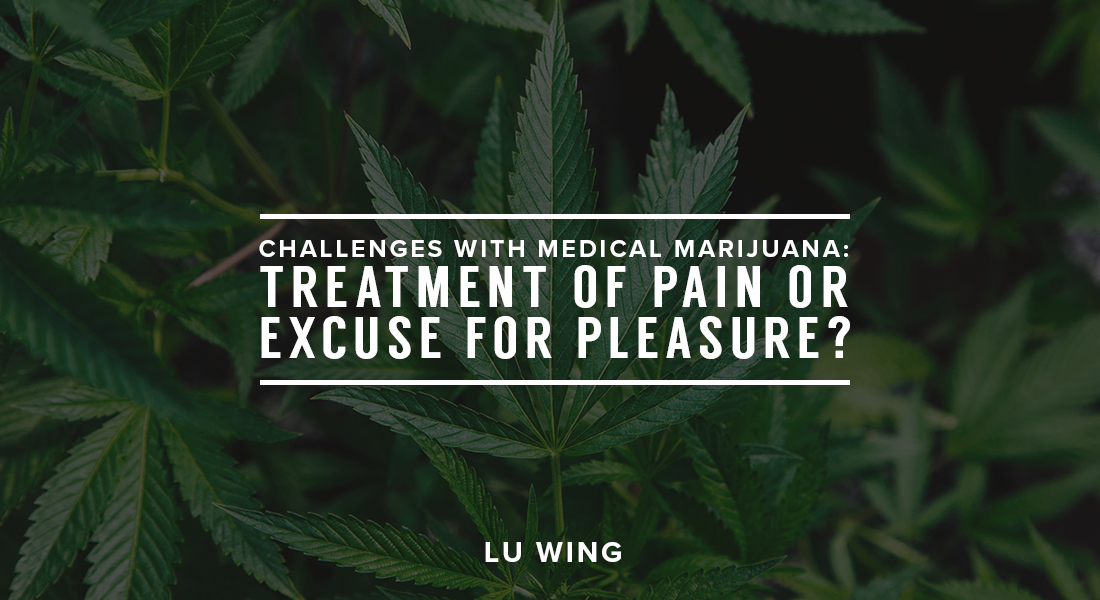
Evidence to support the medical benefits of smoking marijuana for the treatment of pain has become a challenge for many Christians.
Our culture has made a radical shift in the acceptance of marijuana as a medication, which has also paved the way for legalization of marijuana for recreational use.
Marijuana, derived from a species of cannabis, contains a relatively high concentration of the psychoactive chemical called tetrahydrocannabinol (THC). The effects of THC in marijuana include intoxication, alterations to mood and memory and lack of sleep. Although pain relief is included in this list, it is one of many – similar to the pain relief experienced by intoxication from alcohol. Another related chemical to THC present in marijuana is cannabidiol (CBD), which has a much lower concentration than THC and is not psychoactive or a pain reliever.
Although the Bible does not give direct guidance about smoking marijuana, there are some who support the use of it based on the allowance to consume seed-bearing plants (e.g. cannabis) (Genesis 1:11-13; Genesis 2:9). However, because of the intoxicating effects of marijuana, the biblical principles that apply to alcohol should also be used to condemn its use, such as Ephesians 5:18, “Do not be drunk with wine, but be filled with the Spirit,” and 1 Peter 5:8, “Be sober, be vigilant; because our adversary the devil walks about like a roaring lion, seeking whom he may devour.”
The motive for using marijuana, whether therapeutic or recreational, is based on the reason why one chooses to use it. Therapeutic use of marijuana has the goal of treating pain associated with a pathological condition. It is interesting that marijuana is even considered as an option for treating pain, particularly when there are several more effective medications available. Even recreational use of marijuana is motivated by one’s own desire to change or enhance the way our minds process thoughts and ideas. Just like drinking alcohol has the potential for intoxication, one can also drink moderately and not become intoxicated. Curiously, I wonder if this logic also applies to the intoxicating effects of THC (achieved after four inhalations). Can one also reduce the number of inhalations and only be a “moderate” marijuana user? Also like alcohol, self-dosing of marijuana is determined by the amount of THC consumed, or how many inhalations does it take to maximize the euphoric feelings, including pain relief? It is important to note that the therapeutic benefits of THC only occur at intoxicating doses, which means that to experience the beneficial effects of THC, one also must become intoxicated.
As a pharmaceutical toxicologist, I have been immersed in the opioid crisis, with a particular focus on designing studies for abuse deterrence.
When an opioid with abuse potential is evaluated for toxicity, the goal is to understand how much of the drug will maximize the therapeutic effect, while minimizing the potential toxic side effects. The dose is carefully determined to ensure that the positive effect is gained while minimizing any negative consequences. In contrast to this rigorous method of designing an appropriate dose range for a drug, an inhaled dose of marijuana (the most common method of dosing) is not “metered,” or it is not possible to regulate the amount of marijuana entering into one’s lungs. Although it can be taken orally, most people smoke or vaporize marijuana to maximize the rate that the THC is delivered to the brain. With no metered control of the dose of inhaled marijuana, one can vary the dose greatly, even to toxic levels. This is why drugs are regulated with strict guidelines on how much of a dose can be tolerated and for how long. It is also for these reasons that the massive opioid crisis is occurring.
In addition to the health challenges of marijuana, the psychoactive nature of the THC in marijuana also has been a vehicle of gaining a higher consciousness. Entering into a spiritual realm with marijuana has been one of the hallmarks of Eastern religions and cults. Even though there may be pain relief following the use of marijuana, Christians must realize that our “bodies are the temple of the Holy Spirit” (1 Corinthians 6:19). It is for this primary reason that believers must be wise in taking any form of a drug, knowing that we are called to glorify God with all our heart, mind, body and spirit (I Thessalonians 5:23).
Enjoy an interview with Dr. Lu Wing and host Pastor Brian Brodersen on Things That Matter, discussing in further details about the questions of legalized Marijuana.






